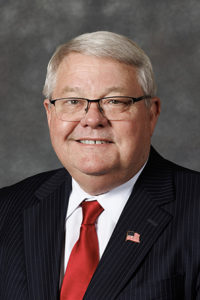Additional medical abortion protocols considered
Members of the Health and Human Services Committee heard testimony Feb. 13 on a bill that would tighten restrictions on Nebraska providers of medications used to perform chemical abortions.

LB512, introduced by Bellevue Sen. Rick Holdcroft, would create the Chemical Abortion Safety Protocol Act to establish additional regulations for medications used to induce abortions through a chemical process rather than through surgery.
Under the bill as introduced, a physician would be required to verify the pregnancy through an in-person examination, determine if the patient has an ectopic pregnancy, document gestational age and perform Rh factor screening before providing abortion-inducing medication.
An amendment brought by Holdcroft to the committee hearing would remove all provisions related to Rh factor testing and treatment because its value in reducing future miscarriages is no longer clear, he said.
The bill also would require a physician to schedule a follow-up appointment between three and 14 days after medication is provided to confirm the pregnancy has been completely terminated and perform an assessment for any adverse events resulting from the medication — such as shock, infection, heavy or prolonged bleeding, hemorrhage or sepsis.
Physicians also would be required to file a report with the state Department of Health and Human Services within 30 days of providing abortion-inducing medication to a patient. The bill would prohibit the report from including any personally identifiable information about the patient.
Holdcroft said LB512 is not intended as an “anti-abortion” measure, but rather to ensure that patients who receive a chemical abortion are not endangered by “careless” providers. He said an abortion clinic located in Bellevue recently was investigated by DHHS for dispensing abortion-inducing medication without a license.
“The recent history of the Bellevue facility … is a big part of the reason I think it’s important to bring LB512,” Holdcroft said. “No matter how any of us feel about the issue of abortion, we can all agree that no pregnant woman should ever be neglected or endangered by a careless abortion provider.”
Speaking in support of LB512 on behalf of the Nebraska Family Alliance, Elizabeth Nunnally. She said it was “appalling” that over 200 women over a three-month period reportedly were prescribed “potentially dangerous drugs” by unlicensed providers in Bellevue.
“Clearly, more protections are needed to keep Nebraska women safe from dangerous abortion practices,” Nunnally said.
Timothy Tesmer, chief medical officer for DHHS, also testified in support of the measure. Approximately 80% of abortions performed in Nebraska are medication induced, he said, but it is difficult to know the exact complication rate due to a lack of follow-up and reporting requirements.
Abigail Delaney, a physician specializing in reproductive endocrinology and infertility, testified in opposition to the proposal.
She said the same medications used to provide chemical abortions often are used in miscarriage and ectopic pregnancy management. These medications are safe and well-known treatments for early pregnancy loss, Delaney said, and forcing patients to return to the facility where their pregnancy loss occurred could be especially traumatic.
“While attempting to further regulate abortion, [the bill] will also de facto regulate miscarriage management,” she said. “There are multiple things that are interconnected about women’s health, and by legislating one, you are affecting [all].”
OB-GYN and reproductive endocrinologist, Elizabeth Constance, also testified in opposition on behalf of the Nebraska Medical Association, noting the challenges associated with legislating the practice of medicine.
Medical research is constantly expanding, she said, and physicians who provide chemical abortions in the state need the flexibility to follow evolving guidelines based on the most up-to-date and accurate scientific evidence.
Bailey Joy Aanenson of the League of Women Voters also opposed the measure. She expressed concern about the impact it could have on Nebraskans like her who are considering starting families.
The state already has a shortage of maternal care providers, Aanenson said, and LB512 could put providers at risk of losing their license for things that are out of their control, such as a patient not returning for a scheduled follow-up visit.
“The reality is, if you have [fewer] maternal care doctors in your state, you are just going to have more maternal deaths,” she said.
Emily Patel, an OB-GYN and maternal fetal medicine specialist, also testified in opposition, calling the proposal a “thinly veiled attempt” to make abortion care more difficult to access and provide “under the guise” of enhanced safety.
If safety were the priority, she said, regulation of abortion-inducing medication would be consistent across all its uses, including labor induction, postpartum hemorrhage and gastric ulcers.
“LB512 will not improve patient safety or health outcomes,” Patel said. “It is about controlling women’s reproductive choices.”
The committee took no immediate action on the bill.


